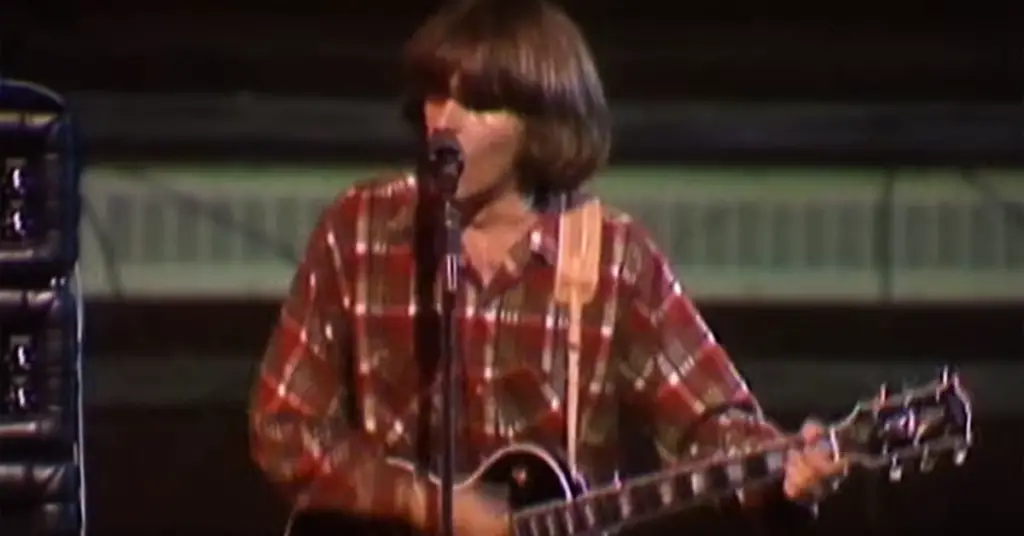Creedence Clearwater Revival – “Bad Moon Rising”: Apocalypse in Three Chords
In the spring of 1969, Creedence Clearwater Revival unleashed “Bad Moon Rising”—a short, upbeat, twangy track that instantly felt like it had always been there. But beneath its toe-tapping groove lies a dark, prophetic warning, one that still sends chills through the American psyche.
Clocking in at just over two minutes, “Bad Moon Rising” is one of rock’s greatest bait-and-switches: a cheerful-sounding tune with lyrics straight out of a disaster movie. And in typical CCR fashion, it was delivered with no frills—just sharp songwriting, swampy rhythm, and John Fogerty’s unmistakable voice cutting through like thunder.
The Sound: Jangly Joy with a Storm on the Horizon
Musically, “Bad Moon Rising” is as clean and tight as roots rock gets. With jangling rhythm guitar, a rockabilly bounce, and a driving backbeat, the track feels almost like a barn dance. It’s joyful. It’s bright. It sounds like good times on the porch.
And then you hear the words.
“I see a bad moon rising…”
“I see trouble on the way…”
Fogerty sings it with his usual bayou-born intensity, but there’s no shriek, no snarl—just a steady, almost matter-of-fact delivery that makes the foreboding even more powerful. It’s like hearing your neighbor casually tell you a hurricane’s about to hit while he flips burgers on the grill.
The Lyrics: Doom With a Southern Drawl
The brilliance of “Bad Moon Rising” lies in its juxtaposition of sound and subject. Inspired by a scene in the 1941 film The Devil and Daniel Webster, John Fogerty wrote the lyrics with a sense of creeping dread and environmental chaos.
“Don’t go around tonight / Well, it’s bound to take your life / There’s a bad moon on the rise.”
Those lines, simple as they are, feel timeless and prophetic. They’ve been interpreted as warnings about natural disasters, political upheaval, war, or even personal breakdowns. In 1969, with Vietnam raging and American cities burning, it felt eerily current. In 2025, it still does.
It’s the kind of song that always seems to mean something, no matter the decade.
The Voice: Fogerty’s Howl of the Heartland
John Fogerty’s voice is one of the most iconic in American rock—raw, soulful, and unmistakably rooted in the blues and country traditions of the South, despite him hailing from California. In “Bad Moon Rising,” his delivery is calm but commanding, as if he’s sounding an alarm and hoping you’ll listen.
His vocal choices never oversell. He trusts the power of the words and the weight of the riff to do their work. That’s part of CCR’s magic: restraint, grit, and authenticity.
The Impact: A Hit with Staying Power
“Bad Moon Rising” was a massive hit, reaching No. 2 on the U.S. Billboard Hot 100 and No. 1 in the UK. It became one of CCR’s signature songs and a staple of their live shows. Over the decades, it’s appeared in dozens of films, TV shows, and commercials—often used to signal something ominous or off-kilter.
It’s also been famously misheard by generations of listeners. One of rock’s most beloved mondegreens is:
“There’s a bathroom on the right…”
Fogerty once leaned into the joke by actually singing that line in live performances—because even when the skies are dark, a little humor never hurts.
Legacy: The Dark Side of the American Dream
“Bad Moon Rising” is a perfect example of why Creedence Clearwater Revival still resonates. They didn’t rely on studio wizardry or elaborate lyrics. They kept it simple, straight, and strong—and somehow said more in two minutes than most bands say in a career.
It’s a reminder that danger doesn’t always come with thunder and lightning. Sometimes it comes with a smile and a sunny melody.
Final Thoughts
“Bad Moon Rising” is a paradox: joyful music about looming disaster.
It’s folk wisdom filtered through a rock ’n’ roll lens.
It’s a party song that knows the roof is about to cave in.
And maybe that’s why it’s never gone out of style—
Because there’s always a bad moon rising somewhere.



Facebook Comments